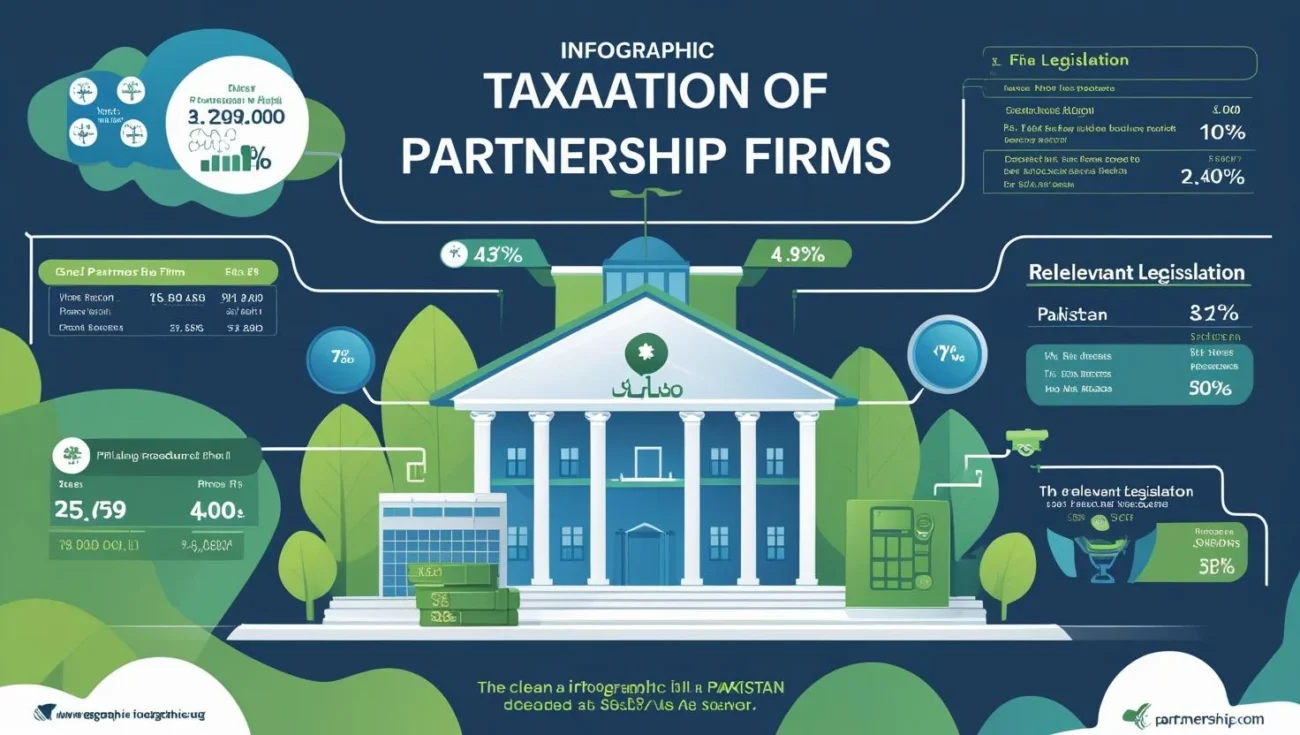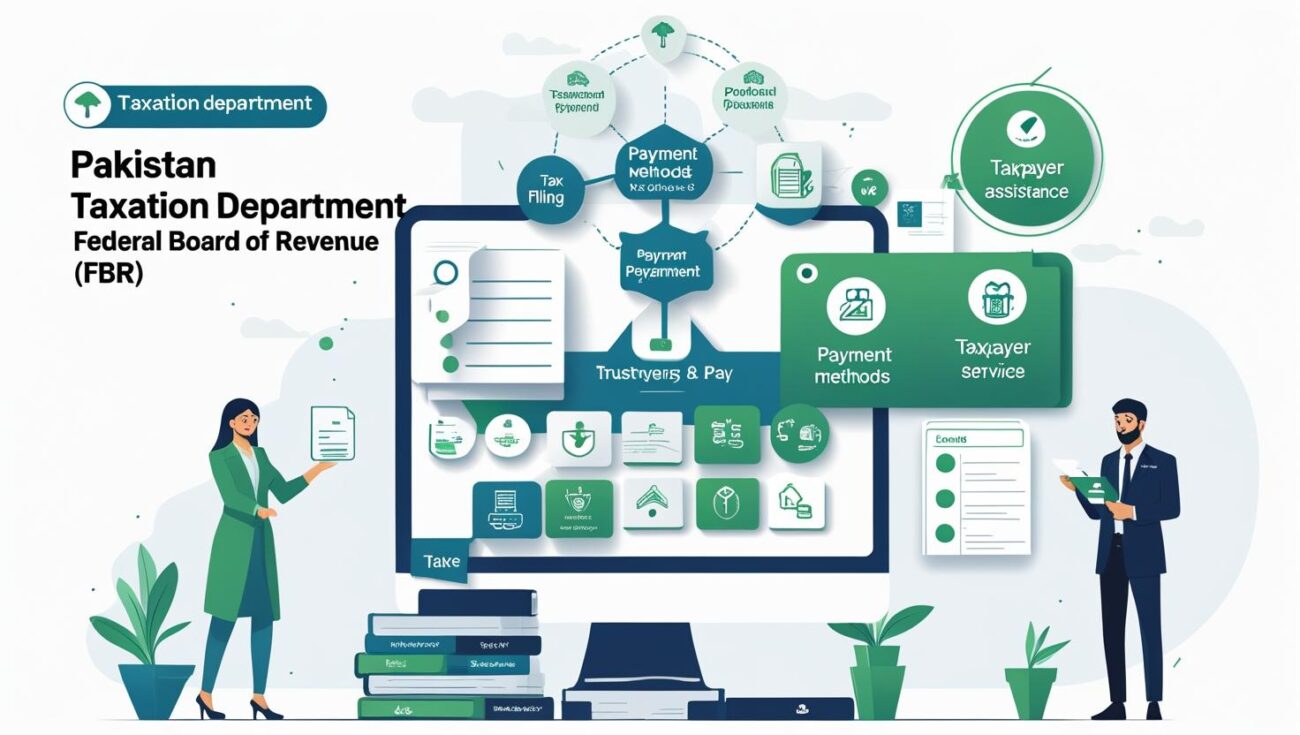With regard to taxation of partnership firm in Pakistan, it falls under the purview of the Income Tax Ordinance, 2001, wherein partnership firms are considered as ‘Association of Persons’ (AOPs). Under current tax regulations, these organizations are considered pass-through entities, allowing earnings to bypass corporate taxation. A partnership firm’s tax treatment has implications for both the firm as a whole, and for the individual partners. For business owners and legal and tax professionals, understanding the taxation of partnership firms in Pakistan helps to enhance compliance and minimize tax liabilities.
Legal Structure and Tax Entity Status
A partnership firm in Pakistan operates as an Association of Persons (AOP) and does not enjoy the separate legal identity afforded to companies. A partnership firm’s legal status under the Partnership Act, 1932 enables it to sue or be sued, and also facilitates the acquisition of a National Tax Number (NTN) from the Federal Board of Revenue (FBR). It is mandatory for taxation of partnership firm in Pakistan to file a business tax return, compute its tax liabilities, and pay tax on its income as per the tax brackets prescribed. Tax on income is determined and paid on the firm level. After tax is settled, profits are distributed among partners who report their share on individual returns.
Determination of Income and Tax Assessment
The taxation of partnership firm in Pakistan starts with the calculation of firm’s income based on sections 59 to 65 of the income tax ordinance. After the income of the firm is computed and assessed, tax is paid based on progressive AOP rates. Under section 69(1), in registered firms, taxation is done in two steps: first, a firm’s taxable income is computed, and tax is paid on it, then, based on the pay out to the partners, each one of them incorporates the profit share in their tax returns. In the case of a non-resident partner, the firm pays tax on their share as if it is in the rates as if the partner was individually taxed.
In cases where the firm is unregistered, the Deputy Commissioner may choose to evaluate the tax either at the firm level or at each partner level; this choice is made based on which is expected to take higher tax payment. This form of taxation is unique to partnership firm taxation in Pakistan; it seeks to enhance revenue collection regardless of the registration status of the firm.
Tax Rates and Surcharges
The taxation of partnership firm in Pakistan follows the AOP income slabs. The tax year 2025 introduces a progressive tax structure, with a tax-free threshold of PKR 600,000. Earnings between PKR 600,001 and PKR 1,200,000 are taxed at 15%, while higher income brackets see tax rates increase up to a maximum of 45% on income above PKR 5.6 million. A surcharge of 10% on the calculated tax becomes applicable where the taxable income exceeds PKR 10 million. These partnership firm taxation policies are intended to achieve equity in taxation, distributing the tax burden according to income levels, and are applicable to the firm’s income prior to distribution.

Impact on Partners and Loss Allocation
In Pakistan, the taxation of partnership firms, the individual profit or loss share of each partner is determined according to the profit-sharing ratio outlined in the partnership deed. Each partner’s allocated profit share is reported in their tax filings. A partner’s share of losses can be offset against other income or be brought forward, as per Sections 34 to 38 of the Ordinance. For registered firms, partners are jointly and severally liable for the tax allocated to their share. This mechanism ensures that the distribution of taxation aligns with the actual profit and loss allocated to each partner.
Minimum Tax and Advance Tax Provisions
In Pakistan, partnership firms are also governed by minimum tax and advance tax rules. As per Section 113, a firm with considerable turnover is still required to pay a minimum tax of 1.25% of turnover even if taxable income is low or nil. Under Section 147, there is a forecasted income tax obligation for advance tax that is to be paid quarterly, which prevents income underreporting. These provisions are part of the tax policy for partnership firms in Pakistan and are designed to reduce tax avoidance and ensure proper compliance with deadlines for tax payments.
Compliance and Administrative Obligations
Compliance assists in enforcing the tax policy for the partnership firm in Pakistan. A partnership firm is required to register with the FBR, keep proper accounting records, and submit annual tax returns. Every partner bears joint and several liability in respect of the firm’s tax obligations, as prescribed under applicable tax laws. Registered partnership firms are required to obtain sales tax registration, if applicable, and submit returns for tax collected and paid, and quarterly advance tax returns. AOPs in Pakistan have been given a greater ease of compliance through the Tax Assan portal, Taxpayer mobile app, and simplified returns for SMEs.
Advantages of Correct Tax Planning
The proper planning and taxation of partnership firm in Pakistan has notable advantages. A registered partnership firm is able to claim deductible business expenses, depreciation, and partner’s remuneration as expenses which diminishes taxable income at the firm level. Accurate reporting of profits enables partners to manage their individual tax exposure. Furthermore, the firm’s registration provides added value as it improves the firm’s reputation, makes it easy to access bank loans, participate in tenders, and provides the firm access to consumer and legal partnership protections.
Concerns and Tax Administration
There is still a gap in the taxation of partnership firm in Pakistan as there are certain gaps that need to be filled. Tax evasion in the informal sector, income underreporting, and low registration of firms are common in these areas. Unregistered partnerships are likely to bear higher withholding taxes for banking, vehicle registration, and certain service expenditures. The FBR’s intelligence and enforcement arms have legal authority to detect non-compliance, and in cases of FBR maladministration, the Federal Tax Ombudsman has jurisdiction to hear appeals. Still, noncompliance gaps are high due to lack of trust and mismanagement.

Policy Outlook and Recommendations
In Pakistan, taxation policy concerning partnership firms can be improved with some specific policy changes. These policies include extending registration to more AOPs and simplifying return submissions for AOPs, adjusting threshold limits to improve voluntary compliance, and improving e-filing systems. The integration and automated invoicing capabilities of FBR under APUTS are useful for tracking and compliance for partnerships and expanding the taxable base. Improving public informational campaigns targeted to SMEs and professional firms can improve formalization and compliance.
Economic Impact and Issues of Equity
Effective taxation of partnership firm in Pakistan aids in fulfilling most of the components of fiscal equity and economic advancement. Since partnerships are taxed on net profits and subsequently distributed to partners, the method in which taxation is applied is proportionate to net income achieved. This model in taxation is favorable for small businesses, professional service firms, and family-owned businesses structured as partnerships. Formal taxation improves the visibility and the legal status of businesses, thus increasing formal economic activities and aid in expanding the taxable base in the country to help fund social development initiatives.
Conclusion
Taxation of partnership firm in Pakistan is streamlined within the framework of the Income Tax Ordinance, classifying firms as AOPs and imposing a progressive income tax, minimum tax, and advance tax where applicable. While registered partnerships enjoy legal standing and structured deductibility, unregistered firms endure greater risks of unintentional non-compliance and higher reporting scrutiny. In terms of tax collection, registration optimizations, reduced compliance burdens, and expanded digital access could improve compliance and equity. Proper taxation of partnership firms aids in domestic revenue collection, enhances economic transparency, increases legal accountability, and improves social equity in Pakistan.


